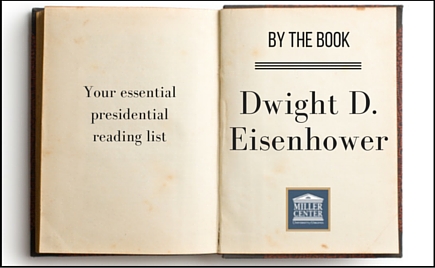By the Book: Dwight D. Eisenhower

The first year of a new president’s first term is always a crucible. But often it’s only in hindsight, within the carefully considered pages of an authoritative presidential biography, that the full measure of that first year can be taken. In this new series on the best presidential biographies, Miller Center presidential scholars and experts recommend the ones most worth reading.
One of the most influential books on Eisenhower, Fred Greenstein’s The Hidden-Hand Presidency (1982), shaped a generation of scholarship on Ike. And too bad! Greenstein’s case for Eisenhower as a behind-the-scenes schemer and crafty Machiavellian rests entirely on Ike’s confrontation with Joe McCarthy. The thesis: In public, Eisenhower refused to tangle with the bilious Wisconsin senator, but in confidential meetings with advisers, Ike laid out a strategy to block McCarthy’s access to White House officials, invoking executive privilege to starve McCarthy of more witnesses for his show trials on the Hill. Fair enough—but the hidden-hand theory falls flat for much of the remainder of Ike’s eight years in office. Eisenhower grappled publicly and visibly with the major issues of the day; there was not much “hidden” about his leadership style.
Stephen Ambrose published a mostly admiring two-volume study of Eisenhower in the early 1980s that was combined into a one-volume life, Eisenhower: Soldier and President (1990). Ambrose was among the first scholars to have access to mountains of newly declassified materials from the Eisenhower papers, but even so, he felt it necessary to invent more: He fabricated personal “interviews” with the former president that never occurred, leaving his entire scholarly corpus forever tarnished.
Jean Edward Smith’s full life, Eisenhower in War and Peace (2012) devotes more time to the war years than to the presidency, and tends to recycle old material. Jim Newton recently produced a well-written and appreciative study, Eisenhower: The White House Years (2011), though it breaks no new ground. Evan Thomas argues in Ike’s Bluff (2012) that Eisenhower perfected nuclear brinkmanship and used it to great effect to end the Korean War, fend off Chinese incursions across Asia, and initiate détente with the Russians. It’s a simplistic view that would persuade few Cold War scholars.
What is missing? These books lack any real engagement with various crucial aspects of Ike’s presidency: his blend of conservative and progressive ideas about the proper role of government in public life; his deep sense of spirituality and the need for a godly republic; his shape-shifting on civil rights, where he favored boldness one day and then dialed back progress on others; his economic policies that blended budget-tightening with massive military and infrastructure spending; and his failed attempt to transform the GOP into a national moderate-conservative party. If Eisenhower remains somewhat elusive in America’s memory, it may be because historians have not adequately illuminated his years in office.